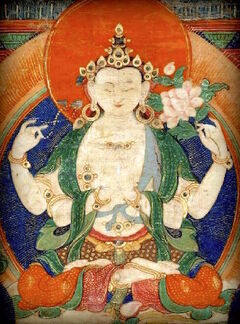Visualization and Recitation of Six-Syllable Mantra
༄༅། །སྤྱན་རས་གཟིགས་ཡི་གེ་དྲུག་པའི་བསྒོམ་བཟླས།
Visualization and Recitation of the Six-Syllable Mantra of Avalokiteśvara
by Mipham Rinpoche
སྤྱན་རས་གཟིགས་ཡི་གེ་དྲུག་པའི་བསྒོམ་བཟླས་སྤྲོས་མེད་ཀྱི་ཚུལ་ཉམས་སུ་བླང་བར་འདོད་པས། ཐོག་མར་སྐྱབས་འགྲོ་སེམས་བསྐྱེད་ཚད་མེད་བཞི་རྣམས་སོང་རྗེས།
If you wish to practise the visualization and recitation of the six-syllable mantra of Avalokiteśvara in a simple, unelaborate way, first take refuge, generate bodhicitta and cultivate the four immeasurables, then recite the following:
ཧྲཱིཿ དག་པའི་ཞིང་ཁམས་པོ་ཊ་ལ་ཡི་དབུས། །
hrih, dakpé zhing kham po ta la yi ü
Hrīḥ. In the centre of the pure realm of Potala,
རབ་དཀར་པདྨ་ཟླ་བའི་གདན་སྟེང་དུ། །
rab kar pema dawé den teng du
Brilliant white, on a lotus and moon disc seat,
རང་ཉིད་འཕགས་པ་སྤྱན་རས་གཟིགས་ཀྱི་སྐུ། །
rangnyi pakpa chenré zik kyi ku
I appear in the form of Noble Avalokiteśvara,
དཀར་གསལ་ཞལ་གཅིག་ཕྱག་བཞི་ཞབས་གཉིས་པ། །
kar sal zhal chik chak zhi zhap nyi pa
White and radiant, with one face, four arms and two legs.
དང་པོའི་ཕྱག་གཉིས་ཐུགས་ཀར་ཐལ་མོ་སྦྱར། །
dangpö chak nyi tukkar talmo jar
My first two hands are joined at my heart, and
འོག་མ་གཉིས་ཀྱིས་ཤེལ་ཕྲེང་པད་དཀར་བསྣམས། །
oma nyi kyi shel treng pé kar nam
The lower two hold a crystal rosary and a white lotus,
དར་དང་རིན་ཆེན་རྒྱན་ལྡན་སྐྱིལ་ཀྲུང་བཞུགས། །
dar dang rinchen gyen den kyiltrung zhuk
I wear silk and jewel ornaments and my seated legs are crossed.
སྤྱི་བོར་བླ་མ་འོད་དཔག་མེད་པས་བརྒྱན། །
chiwor lama öpak mepé gyen
And adorning my crown is Lama Amitābha, Buddha of Boundless Light.
འཁོར་དུ་སངས་རྒྱས་བྱང་སེམས་སྤྲིན་ལྟར་གཏིབས། །
khor du sangye chang sem trin tar tib
All around are buddhas and bodhisattvas gathered like clouds.
གནས་གསུམ་ཨོཾ་ཨཱཿ་ཧཱུྂ་གི་འོད་ཟེར་གྱིས། །
né sum om ah hung gi özer gyi
From the oṃ āḥ hūṃ at my three centres stream out rays of light
ཡེ་ཤེས་ལྷ་ཚོགས་སྤྱན་དྲངས་གཉིས་མེད་བསྟིམ། །
yeshe lha tsok chen drang nyimé tim
Inviting the hosts of wisdom deities, who dissolve indivisibly.
ཐུགས་དབུས་པད་ཟླའི་གདན་ལ་ཡི་གེ་ཧྲཱིཿ །
tuk ü pé dé den la yigé hrih
In the centre of my heart on a lotus and moon disc seat is the syllable hrīḥ,
དེ་མཐར་སྔགས་ཀྱི་ཕྲེང་བས་བསྐོར་བ་ལས། །
de tar ngak kyi trengwé korwa lé
Surrounded by the mantra garland. From it
འོད་འཕྲོས་འཕགས་མཆོད་འགྲོ་ཀུན་སྒྲིབ་པ་སྦྱོངས། །
ö trö pak chö dro kün dribpa jong
Light streams out, making offerings to the noble ones and purifying the obscurations of all beings.
ཞིང་ཁམས་ཐམས་ཅད་རི་པོ་ཏ་ལའི་ཞིང་། །
zhing kham tamché ri po ta la'i zhing
The whole environment becomes the realm of Mount Potala.
སྣང་བ་ཐམས་ཅད་ཐུགས་རྗེ་ཆེན་པོའི་སྐུ། །
nangwa tamché tukjé chenpöi ku
All that appears is the form of the Great Compassionate One,
སྒྲ་གྲགས་ཐམས་ཅད་ཡི་གེ་དྲུག་པའི་གསུངས། །
dra drak tamché yigé drukpé sung
All sounds the speech of the six-syllable mantra,
དྲན་རྟོག་ཐམས་ཅད་སྟོང་ཉིད་སྙིང་རྗེའི་ཐུགས། །
dren tok tamché yong nyi nyingjé tuk
And all thoughts the wisdom mind of emptiness and compassion.
འཛིན་མེད་ཁྱབ་བདལ་གཉུག་མའི་ངང་ནས་བཟླས། །
dzin mé khyabdal nyukmé ngang né dé
Out of the genuine nature, beyond grasping and all-pervading, I recite the mantra:
ཨོཾ་མ་ཎི་པདྨེ་ཧཱུྂ།
om mani pemé hung
oṃ maṇi padme hūṃ
ཞེས་ཡི་གེ་དྲུག་པ་དང་། དེ་ལ་ཧྲཱི་བཏགས་པའི་ཡི་གེ་བདུན་མ་གང་འདོད་བཟླས་པར་བྱ། སྐབས་སུ།
Recite this six-syllable mantra, or, if you wish, by adding hrīḥ, the seven-syllable mantra. Then, at some point, continue with:
ཧྲཱིཿ རང་གི་སེམས་ལ་སེམས་ཀྱིས་ལྟོས། །
hrih, rang gi sem la sem kyi tö
Hrīḥ. At my own mind, with mind, I look:
ངོས་བཟུང་མེད་པས་ནམ་མཁའ་འདྲ། །
ngö zung mepé namkha dra
With nothing to identify, it's just like space,
ཅི་ཡང་མ་མཐོང་སང་ངེ་བ། །
chi yang ma tong sang ngé wa
With nothing whatsoever to see, vividly clear,
ངོ་བོ་སྟོང་པ་ཉིད་དུ་གནས། །
ngowo tongpa nyi du né
In that essence, which is emptiness, I remain.
ཨོཾ་མ་ཎི་པདྨེ་ཧཱུྂ་ཧྲཱིཿ
om mani pemé hung hrih
oṃ maṇi padme hūṃ hrīḥ
སྟོང་པ་ཟང་ཐལ་ངང་ཉིད་ལས། །
tongpa zangtal ngang nyi lé
Out of that experience of unimpeded emptiness
སྣང་བ་མ་འགག་ས་ལེ་བ། །
nangwa ma gak sa lé wa
Appearances arise, unobstructed and vividly clear,
རིས་མེད་ཀུན་ཁྱབ་འདུས་མ་བྱས། །
rimé kun khyab dü ma ché
Without bias, all-pervasive, uncompounded,
རང་བཞིན་འོད་གསལ་ངོ་མཚར་ཆེ། །
rangzhin ösal ngotsar ché
And with the nature of clear light – how wonderful!
ཨོཾ་མ་ཎི་པདྨེ་ཧཱུྂ་ཧྲཱིཿ
om mani pemé hung hrih
oṃ maṇi padme hūṃ hrīḥ
གསལ་བཞིན་སྟོང་ལ་སྟོང་བཞིན་གསལ། །
sal zhin tong la tong zhin sal
Clear yet empty, and empty yet clear,
གསལ་སྟོང་དབྱེར་མེད་བསམ་བརྗོད་བྲལ། །
sal tong yermé samjö dral
Clarity and emptiness indivisible, beyond thought and expression—
ལྷན་སྐྱེས་གཉུག་མ་བདེ་ཆེན་འདི། །
lhen kyé nyukma dechen di
This innate, genuine state of perfect bliss,
ངེས་དོན་སྤྱན་རས་གཟིགས་དབང་ཡིན། །
ngedön chenrezik wang yin
Is the ultimate Lord Avalokiteśvara.
ཨོཾ་མ་ཎི་པདྨེ་ཧཱུྂ་ཧྲཱིཿ
om mani pemé hung hrih
oṃ maṇi padme hūṃ hrīḥ
ཞེས་པའི་དོན་བསམ་ལ་བཟླ།
Considering the meaning, recite the mantra.
མཐར་དགེ་བ་བསྔོ་ཞིང་བཀྲ་ཤིས་བརྗོད་པར་བྱའོ། །
Finally dedicate the merit and recite verses of auspiciousness.
འདི་ནི་རྒྱུད་ལུང་མན་ངག་གི་དོན་བཞིན་ནཱ་ཐཱ་བི་ཛ་ཡི་ཉམས་ལེན་དུ་མི་ཕམ་པས་བྲིས་པ་དགེའོ། །མངྒ་ལཾ།།
I, Mipham, wrote this according to the meaning of the tantras, scriptures and pith instructions for Nāthavija's practice. May it be virtuous! Maṅgalaṃ!
| Translated by Ane Ngawang Tsöndrü and Adam Pearcey, 2015.
Source:
mi pham rgya mtsho. "spyan ras gzigs yi ge drug pa'i bsgom bzlas/." In gsung 'bum/_mi pham rgya mtsho. 32 volumes. Chengdu: [gangs can rig gzhung dpe rnying myur skyobs lhan tshogs], 2007. Vol. 25: 547–548.
Version: 1.4-20220622
